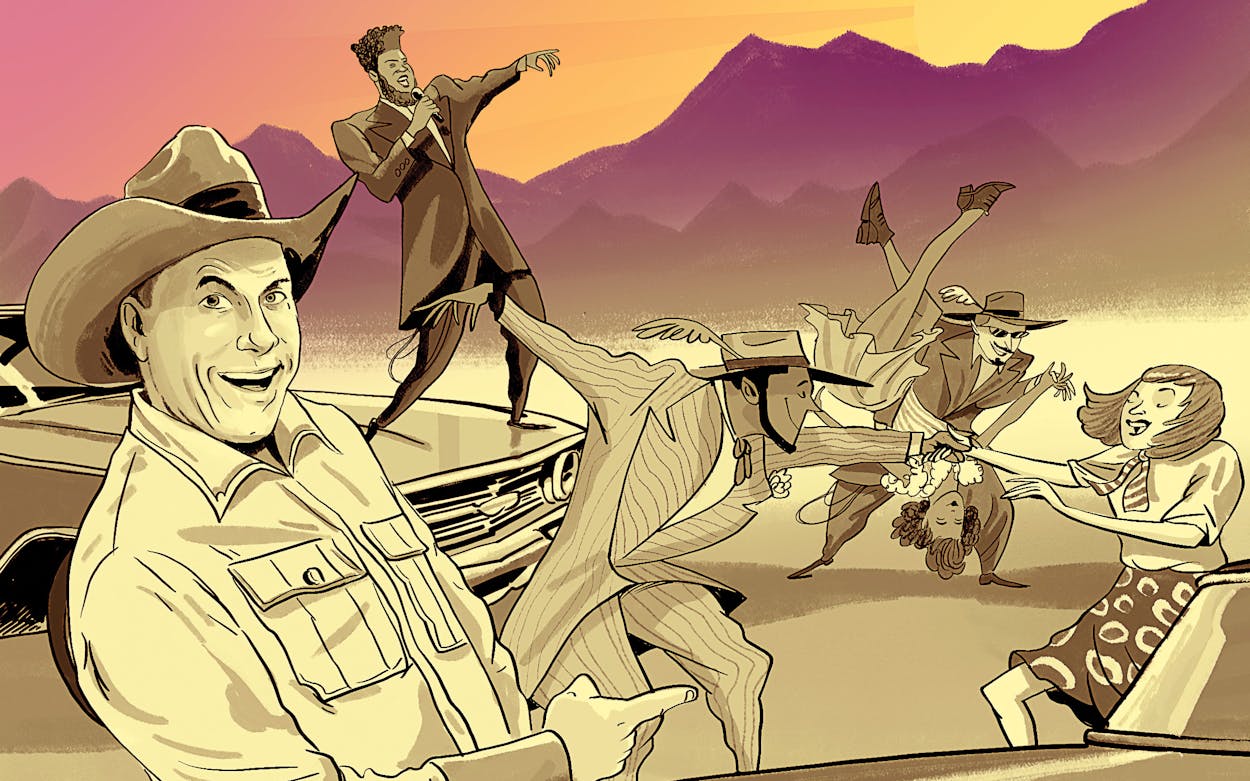Q: Why do I sometimes hear El Paso referred to as El Chuco?
Carlton Williams, San Antonio
A: Many are the Texas towns possessed of appellations other than the official names by which they are known. Familiar examples of such nicknames include “Big D” (Dallas); “Cowtown,” “Panther City,” “Funky Town,” and “Queen City of the Prairie” (Fort Worth); “Space City,” “Bayou City,” “Clutch City,” and “H-Town” (Houston); “River City” and “Alamo City” (San Antonio); and “the City of the Violet Crown,” “the Live Music Capital of the World,” and, much less often, “Texanist Town” (Austin, where the Texanist lives). Temple, where the Texanist grew up, by the way, was at various times known as “Ratsville,” “Mudville,” and “Tanglefoot.”
Many such sobriquets have backstories that are obscure, or even mysterious. But in most cases their geneses are obvious, a nod to some well-known historical, geographical, or cultural aspect, or often just something conjured up by chambers of commerce with an eye toward marketing.
Dallas, for instance, is big and begins with the letter D. (Big duh.) Fort Worth was, obviously, once a hub for cattle making their way to market. And back in the late nineteenth century, a “Big D” newspaper column criticized its neighbor and rival for being so excessively sleepy that a panther that had wandered into “Cowtown” nodded off on Main Street, undisturbed by local residents. Those townsfolk reacted to the good-natured derision by adopting the name “Panther City.” The more recently coined “Funky Town” moniker, which is said to have originated with local R&B and hip-hop artists, was popularized through an effort by citizens to promote the phrase “Keep Fort Worth Funky,” a nugatory response to the well-worn slogan “Keep Austin Weird.”
“Queen City of the Prairie” appears to be an example of a popular nicknaming convention from days of yore. Galveston, a.k.a. “the Oleander City,” was once known as “the Queen City of the Gulf”; Indianola was referred to as “the Queen City of the West”; Mercedes is “the Queen City of the Valley”; and both Brownsville (a.k.a. “the Chess Capital of Texas”) and Del Rio (which currently seems to be without a nickname) have at various times claimed “Queen City of the Rio Grande” for themselves. And then, of course, there’s plain old Queen City, located just south of Texarkana, which has reigned with that name since 1877. There was once even an old-timey attempt to dub Temple “Prairie Queen.”
Let’s keep going. Houston is home to NASA’s Johnson Space Center and teeming with bayous, hence “Space City” and “Bayou City.” “Clutch City” came about after the Houston Rockets’ clutch showing in the 1994 NBA postseason, though “Choke City” had been bandied about when the team got off to a poor start with the Phoenix Suns in that same series. “H-Town,” much like “Big D,” is obvious. As are both of San Antonio’s best-known nicknames, “Alamo City” and “River City.”
Austin’s “Live Music Capital of the World” claim is also obvious (if occasionally disputed by denizens of New Orleans and New York). The “City of the Violet Crown” handle has murkier origins, though it is thought to be related to an atmospheric phenomenon known as the Belt of Venus, which sometimes causes the horizon around Austin, just before sunrise and just after sunset, to glow with a pinkish-purplish hue. There’s another theory that involves ancient Athens—which was also known as the “City of the Violet Crown,” because of the pinkish-purplish appearance of nearby mountains—and a decades-old campaign to refer to Austin as “the Athens of the South.” (This was apparently inspired by the town’s flagship university but came to naught, perhaps because Nashville, home of Vanderbilt University, had already laid claim to that tag and because another Southern college town, in Georgia, is actually named Athens.)
As for the Texanist’s hometown, Temple’s mocking monikers are said to stem from the municipality’s early rodent problem and its excessively muddy streets, which were apparently difficult to navigate without getting one’s feet tangled. The Texanist will further note, however, that Temple was also known as “the City of Trees,” in recognition of the Texas Forestry Association, which was founded there. And as long as the Texanist is bragging, he’ll mention that Temple is today known as “the Wildflower Capital of Texas,” a designation it shares with DeWitt County, which, technically speaking, makes it a wildflower capital of Texas.
Those are all fascinating origin tales, apocryphal and otherwise. But, circling back around to your actual question, Mr. Williams, the Texanist will tell you that he finds the story behind El Paso’s “El Chuco” alias to be the most interesting of them all. While El Paso is these days probably best known as “Sun City” (it is perennially one of the top ten sunniest cities in the country), at various times in its past it was, because of its Wild West lawlessness, known as “the Six-shooter Capital” and “Sin City.” More recently, the R&B star Khalid, who spent his later teenage years in Sun City, ID’d it in one of his songs as “the City of the 915”—which is, of course, the local area code—a label that seems to have caught on.
But where does the long-standing “El Chuco” come from? Well, it turns out that back in the thirties, El Paso was ground zero for a cultural movement in which rambunctious young Mexicans and Mexican Americans who were leery of assimilation found empowerment through acts of social rebellion. The men and women who made up this subculture became known as pachucos and pachucas and distinguished themselves by wearing flashy, loose-fitting zoot suits; styling their hair in pompadours; dancing to swing music; indulging in the occasional use of marijuana; and developing their own patois. The phenomenon eventually went national, leading directly to the popular cruising and lowrider scenes that can still be found throughout the country, and somewhat less directly to the Chicano movement. “Chuco” is, of course, short for “pachuco,” hence El Chuco.
The word “pachuco,” by the way, has its own fascinating backstory. Some believe that it came about when residents of Ciudad Juárez who worked at an El Paso shoe company could be heard saying that they were going “pa el shoe co.,” or “to the shoe co.” Pa el shoe co. Pachuco. Not implausible. There’s another theory that the word is derived from the city of Pachuca, the capital of the Mexican state of Hidalgo, where it’s said that men preferred loose-fitting pants.
While “El Chuco” is not the only option available to those who want to call El Paso something other than “El Paso,” the Texanist believes it has panache and a bit more heft than “Sun City” or “the City of the 915,” as well as a healthy dose of historical resonance. It’s a great nickname for the city that birthed a subculture that would leave an indelible mark on Texas and the world beyond. For the Texanist’s money, it can’t be beat.
¡Viva El Chuco!
Have a question for the Texanist? He’s always available here. Be sure to tell him where you’re from.
This article originally appeared in the May 2022 issue of Texas Monthly with the headline “The Texanist.” Subscribe today.
- More About:
- The Texanist
- El Paso









